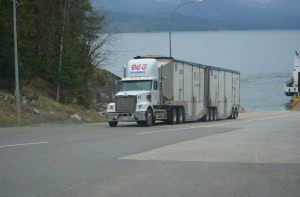Forming an LLC for a trucking business is extremely common structure. This LLC entity is appealing to trucking companies largely due to the risks associated spending hours on the road with a fully loaded trailer towing a load of 80,000 pounds.
An LLC also offers other major advantages for trucking businesses, although it isn’t the only structure available for this type of company. Making the best choice for your company requires careful consideration of many factors so I’ve broken down the advantages, disadvantages, and other considerations you should know unique to trucking companies before you file. Ready to get your trucking business on the road? Let’s do this.
- Form an LLC for a Truck Driving Business with ZenBusiness ($39 + State Fees)
Page Contents
- Advantages of an LLC for Truck Drivers
- Personal Asset Protection
- Tax Benefits
- Higher Credibility
- Disadvantages for Truck Drivers
- How to Start an LLC as a Truck Driver
- 1. Choose a name for your truck driving LLC.
- 2. File the Articles of Organization.
- 3. Choose a registered agent.
- 4. Create an LLC operating agreement for a truck driving business.
- Publication Requirements
- How Much Does an LLC Cost for a Truck Driving Business?
- Permits and Protection Beyond the LLC
- Frequently Asked Questions
- Is LLC a good option for truck driving?
- What are the disadvantages of an LLC for truck driving?
- Do you need an LLC for truck driving?
- Truck Driving Sole Proprietorship vs. LLC
- Trucking LLC vs. Corporation
- What is an LLC?
- Form Your LLC Now
Advantages of an LLC for Truck Drivers
The trucking industry is valued at more than $791 billion in the United States alone. The advantages of an LLC for truck driving include personal asset protection, tax benefits and higher credibility.
Personal Asset Protection
The biggest advantage of forming an LLC for a truck driving business is the protection of personal assets this business structure provides. You need the limited liability protection of an LLC if you own this type of business, whether you’re operating as a sole proprietor or already have a fleet of drivers and trucks.
Assume for this example that you run off the road and damage your load. If you’re operating as a sole proprietorship or general partnership, personal assets such as your bank account house and car could be at risk if your client decides to sue you for damages.
In comparison, the scope of your client’s lawsuit would be limited to just the business’s assets if it’s an LLC, meaning you wouldn’t lose your personal assets even if your business lost the suit against it. This outcome assumes that your operation and maintenance of your business complies with the many state and federal regulations regarding the trucking industry.
Tax Benefits
Taxation is another major advantage of LLCs for truck drivers. This business structure allows you to select one of two taxation methods, including taxation as a sole proprietorship or as a corporation. Both of these options can save you a considerable amount of money over operating as an informal business.
The default option is taxation as a sole proprietorship, which is usually the best choice for a trucking business starting out with a single vehicle. Tax payments are simpler, as you simply pay taxes on your business’s revenue as an individual.
As a trucking company, you need to find as many ways as possible to retain profitability. It’s not just about how much you make, but how much money you get to keep after taxes, gas, and vehicle maintenance.

On the road again.
Higher Credibility
The improved credibility of an LLC is a particular advantage for a trucking business. Informal businesses don’t require unique business names, as they usually operate under their owners’ personal name. For example, if you’re a trucker and your name is John Doe, the assumed name of your business is also John Doe. However, this isn’t the most appealing name for a trucking business.
An LLC ensures that your business name is unique, although the name still needs to have the terms “limited liability company” or “LLC” in it. This uniqueness provides your business with greater professionalism, which customers respect. In addition, customers typically feel more comfortable writing checks to a company than an individual.
Disadvantages for Truck Drivers
The disadvantages of forming an LLC for a trucking company include the increased cost and effort of maintaining it as compared to a sole proprietorship. In addition, an S corporation can reduce your self-employment taxes compared to an LLC, which is currently 15.3% on business income.
In this tax model, you can pay yourself a salary and only pay self-employment tax on that portion of your income. You can then reinvest the remaining income into your business without paying self-employment tax on it.
How to Start an LLC as a Truck Driver
The specific process for forming an LLC depends on your state, although the basic steps are the same. These include the following:
- Choosing a company name
- Filing the Articles of Organization
- Choosing a registered agent
- Creating an operating agreement
1. Choose a name for your truck driving LLC.
Selecting a name for your business is one of the most challenging aspects of creating an LLC for a trucking company. One reason is with an estimated 1.2 million trucking companies active in the United States, many of the obvious names have been taken. Business names are highly regulated, and the wrong choice can result in cause your entire application getting rejected. Fortunately, these laws are fairly similar between states.
Related Reading: Starting an LLC for a Delivery Service Business (In-Depth Analysis)
The primary consideration is that your state doesn’t want potential customers to be confused about your business. As a result, the name can’t be the same as any existing business. Some states also have laws against business names being too similar, even when they aren’t identical. Furthermore, your LLC’s name can’t infringe on copyrights. Long story short, you’ll want to pick a distinct name that isn’t used elsewhere.

Do you need an LLC for your trucking company?
All states provide a search function that allows you to check your business name’s eligibility, typically located on the state website. Sometimes, you won’t be able to use the name you want or any variation of it requiring you to get more creative with the name.
- Form an LLC with ZenBusiness ($39 + State Fees)
Finally, your business name can’t refer to other professions, especially those that are highly regulated. For example, the name of a trucking business wouldn’t be able to include words like “bank,” “hospital” and “lawyer.” This probably won’t be an issue, but is worth noting.
2. File the Articles of Organization.
The process for filing Articles of Organization for your LLC includes gathering the required information, submitting it and paying the filing fees.
Gathering Information
Each state uses its own form to provide the information it needs for your LLC’s Articles of Organization. Furthermore, these forms can vary considerably, although they generally require the following:
- Business name
- Business address
- Registered agent
- Owner and member name
- Organizer name
- Manager name
Submission
A couple of options exist for submitting your LLC’s Articles of Organization to your state. If you already have a business lawyer, you’ll probably just submit your Articles of Organization to that person. A business lawyer should have detailed knowledge about filing this document, allowing you to remain secure that it will be filed correctly.
Another possibility is to use an LLC formation service, which can handle Articles of Organization as well as other documents related to business maintenance activities like annual reports and paying franchise taxes. Entrepreneur truck drivers will typically choose this option, since it costs much less than an attorney.
Filing Fees
Articles of Organization require a fee to file them, although the amount varies greatly by state. Filing fees can range from $50 to $500.
3. Choose a registered agent.
A registered agent services a point of contact for all legal matters regarding your business, which is a legal requirement for any LLC. This legal entity receives a variety of business documents from your LLC’s state government, including filing reminders, service of process and tax forms. It promptly forwards those documents to you, as many of these documents are time-sensitive. Choosing a reliable registered agent for your LLC is highly important due to the consequences of missing a filing deadline. The registered agent for your LLC can be yourself, a lawyer or accountant, or a registered agent service.
Selecting yourself as the registered agent for your LLC has some advantages. For example, it can save you money if you already need to be available during the business day. However, this requirement also means you can’t take vacations or sick days when you’re a registered agent.
A lawyer or accountant is often a good choice for a registered agent, especially if you already have one for your business. However, it can be quite expensive to use these professionals for this purpose, and they’re often unfamiliar with the responsibilities of a registered agent. Additionally, it limits your business to states where your attorney or accountant has an office, which can be particularly restrictive in the case of a trucking business.
A registered agent service is often the best choice for a truck driving LLC, since these services typically maintain offices in all 50 states. These companies typically specialize as registered agents and are highly knowledgeable about their responsibilities. Many of these services exist. So you should study review sites for registered agents to determine the best one for your business.
4. Create an LLC operating agreement for a truck driving business.
An operating agreement describes how you plan to operate your LLC by establishing a set of rules and regulations. It also defines structures for its management and ownership of the company, which helps provides it with legitimacy for organizations like banks and courts.
In addition, an operating agreement specifies the distinction between your assets and those of your business. The basic provisions of an operating agreement include the following:
- Identifying information: This is your business name.
- Statement of intent: You intend to transport supplies or materials in a safe and timely manner to different markets across the United States.
- Business purpose: Transporting food, products, or equipment from point a to point b.
- Term: Explain the terms of the agreement for all the members. If there’s only one owner this simplifies the section.
- Tax treatment: Pick between sole proprietorship, partnership or corporation.
- Admission of new members: Single or multi-member
The LLC’s identifying information includes its name and address for its initial registered office and principal business office.
A statement of intent indicates that the operating agreement is in accordance with the laws of your state, and that the LLC will be formed once the appropriate documents have been filed with that state.
A statement of business purpose indicates the nature of the business. It’s also a good idea to include a statement like “and for any other lawful business purpose,” so you can change the purpose of the business without issuing a new operating agreement.

Big time trucking.
The LLC’s term indicates when it will cease operations. It will typically state that the business will continue operating until terminated in accordance with state law. However, LLCs that are formed for a specific purpose may be terminated after a specific period of time or until a certain event occurs.
Tax treatment is the LLC’s taxation method, where the LLC could be taxed as a sole proprietorship, partnership or corporation.
The admission of new member describes the method for someone to acquire an interest in the LLC. The absence of this provision could require you to prepare a new operating agreement if you want to add partners later.
Most states don’t require an operating agreement for a trucking company. Here are the five states that require it:
- California
- Delaware
- Maine
- Missouri
- New York
New York is the only state that requires a written operating agreement, as the other four states on the above list accept oral agreements. Nevertheless, you should maintain an operating agreement, even if your state doesn’t require it. This makes your trucking company more legitimate.
Publication Requirements
Only Arizona, Nebraska and New York require you to publish a notification of your LLC’s formation in a newspaper.
Arizona
Section 29-3201 of the Arizona Revised Statutes regulates the publication requirements for LLCs in that state. The notice must run in a newspaper for three consecutive runs, which generally means one day per week for three weeks. The newspaper will mail you an Affidavit of Publication after your ad run completes, which you should file with the Arizona Corporation Commission (AZCC).
Nebraska
Nebraska Revised Statute 21-193 requires LLCs formed in that state to publish a Notice of Organization in a newspaper with general circulation, typically in the same county as the LLC’s designated office address. The ad must run for 3 weeks, after which you’ll receive an Affidavit of Publication from the newspaper.
New York
Section 206 of the New York LLC Act governs the requirement for publication requirements in that state. LLCs formed in New York must publish a notice of their formation in two newspapers, both of which must be approved by the County Clerk for that county. One newspaper must have a daily circulation, and the other must have a weekly circulation. In New York these ads must run for six consecutive weeks.
How Much Does an LLC Cost for a Truck Driving Business?
The cost to complete an LLC filing depends on the state. You can expect to pay under $100 in Kentucky or $500 in Massachusetts.
The cost of forming an LLC can vary widely based on the company you use too. ZenBusiness, IncFile and Northwest use very different pricing models for their LLC formation services.
IncFile offers a free business formation package, provided you pay your own state fee. This package also includes their registered agent service for one year.
Many business owners consider ZenBusiness to be the best online LLC formation service. Its packages start at $39, depending on the specific services you want.
Northwest’s LLC filing package includes registered agent service with local document scanning. It costs $225 in addition to the state filing fee.

Trucking powers the global economy.
Permits and Protection Beyond the LLC
A truck driving permit requires additional permits and protection beyond that needed to form the LLC.
Permits
The U.S. Department of Transportation (DOT) requires truck driving companies to have an ID that it uses to collect and monitor safety information. Commercial truckers also need DOT approval on the specific types of cargo they can carry.
The federal government charges an annual tax on vehicles weighing more than 55,000 pounds, which funds highway programs. The International Registration Plan (IRP) also charges registration fees based on the distance a truck travels. The International Fuel Tax Agreement (IFTA) simplifies the reporting of fuel use by trucks traveling through multiple states.
Protection
Trucking businesses require multiple forms of insurance. These include $750,000 in primary liability coverage for at-fault accidents. They also need at least $100,000 of insurance to cover damage and theft of the cargo.
Insurance against physical damage caused by accidents in which the truck driver wasn’t at fault is also required for commercial trucking. In addition, bobtail insurance covers damages that the truck driver is liable if it occurs while the truck isn’t carrying a load.
Frequently Asked Questions
Is LLC a good option for truck driving?
When deciding if an LLC is the best structure for your truck driving business, you need to consider your level of risk and the amount of personal assets that would be at risk if it remains a sole proprietorship.
Driving a large truck creates more liability than many other types of small businesses, so it usually makes sense to form an LLC in this case before you even start the business. Bottom line, most truck drivers opt to form an LLC as an added layer of protection since there’s a clear and present risk to driving an 18-wheeler.
What are the disadvantages of an LLC for truck driving?
The biggest reason not to use an LLC for a truck driving business is that it requires more administrative overhead than either a limited partnership or sole proprietorship. Furthermore, a corporation doesn’t require an operating agreement because existing statutory requirements govern their behavior.
Do you need an LLC for truck driving?
If you’re an employee of a trucking company, you won’t need to form an LLC. In this situation, the company you work for is responsible for the business structure and insurance.
The issue of needing an LLC for a truck driving business generally comes down to the protection of personal assets. The insurance that these businesses must carry only protects business assets, making it especially important for a trucking business to distinguish between business assets and the owner’s personal assets.
Truck Driving Sole Proprietorship vs. LLC
In a sole proprietorship, there is no distinction between you and your business. An LLC legally separates the business from the owner, which protects the owner’s personal assets like a home, savings, or automobiles.
Trucking LLC vs. Corporation
Both an LLC and a corporation protect owners from their business liability. Most trucking businesses are LLCs because this structure allows more freedom in the business’s operation and management.
What is an LLC?
A limited liability company (LLC) is a business structure that combines the limited liability of a corporation with the taxation of a partnership or sole proprietorship. This taxation method means that the LLC doesn’t pay taxes itself, so the owner includes company profits or losses on their personal tax returns.
It’s also possible for an LLC to be taxed like a corporation, although this option isn’t very common. An LLC is also similar to a corporation in that the owners are usually not personally accountable for the LLC’s financial obligations, meaning the owner’s personal assets aren’t at risk
Form Your LLC Now
Ready to form an LLC for your trucking company to protect your business? Click here to start the process LLC formation process with ZenBusiness for $39 + State Fees. It took me around 30 minutes to complete the entire filing process through this service.




